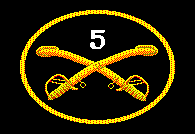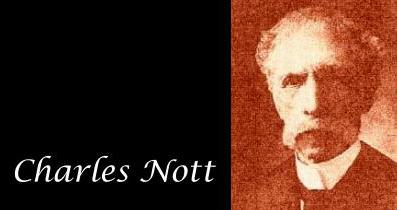

Captain Charles C. Nott had a brief but distinguished career with the Fifth Iowa Cavalry. He was also a gifted writer who left a small legacy of his civil war reflections for posterity. One of his more "fantastic" stories is found here at the Fifth Iowa Volunteer Cavalry website.
Nott was appointed to a captaincy in the Curtis Horse and served as the captain of Company E until he left the regiment to recuperate after a serious injury received during a skirmish. Returning to his home state of New York, he was appointed to serve as the lieutenant colonel of the 131st New York Infantry. However, before he could properly assume his duties with this unit, he was selected to assume command of a newly raised regiment, the 176th New York Infantry. Fighting primarily in the Gulf theater, his new regiment earned the nickname, "Ironsides." Unfortunately, the regiment met with misfortune at Brashear City, Louisiana, where they were defeated by Confederate forces. Colonel Nott was ill during the engagement, and was among a large number of Union soldiers who were captured. He was held a prisoner of war for the next thirteen months; he spent the majority of that time at Camp Ford, the largest Confederate prison west of the Mississippi.
He must have made a very positive impression on the men he led in the Fifth Iowa Cavalry. One of them, Josiah Conzett, wrote in his Civil War memoirs: "on July 5th one more dear little son arrived… we named him after my first Captain in the Army--Charles Nott."
Following his repatriation, Nott returned to his life as an attorney and was appointed to the federal bench as one of President Lincoln's final judicial nominations. He served the Chief Justice of the United States Court of Claims when it failed to permit a female attorney to represent a client, during that pre-suffrage era. He wrote: "A woman is without legal capacity to take the office of attorney. After all, since a woman's husband was responsible for her debts, if a female attorney embezzled clients' trust funds, the court would have to put the husband in jail." Despite this (not controversial) ruling, the majority of his decisions are highly commended by judicial authorities of the modern era. When we retired at the beginning of the twentieth century, he was the longest serving federal judge in the country.
Nott wrote on a variety of legal and political subjects. For several years he served as a primary contributor of (unsigned) editorials in the pages of The Republic. Fortunately, Nott's writings were not limited to judicial matters; he also recorded various reflections from the War Between the States. Shortly after the war he wrote Sketches of the War, which was primarily a collection of his wartime correspondence. He subsequently composed Sketches of Prison Camps, a sequel to his to his first study of the recent war of the rebellion.
We are quite fortunate to have recovered here a short story which was originally published in the March 1893 issue of Scribner's Magazine. "The Tale of a Goblin Horse" vividly describes a mount like no other.
Nott describes the German veterans of the Fremont Hussars "who knew a thing or two of soldiering and horses, and who held that the best of troopers would be useless to the cause of freedom unless he were well mounted." The horse in question had intentions other than being ridden into battle, and Nott relates the judicious impression that "Animus was clearly a fiend--an emissary of the Devil or J. Davis (it made little difference which)..." The ten page story which follows is recorded on quite legible graphic files reproduced from the original magazine. Thus, you will need to access each successive page from links below.
"The Tale of a Goblin Horse"
Page One
Page Two
Page Three
Page Four
Page Five
Page Six
Page Seven
Page Eight
Page Nine
Page Ten
Page One
Page Two
Page Three
Page Four
Page Five
Page Six
Page Seven
Page Eight
Page Nine
Page Ten
